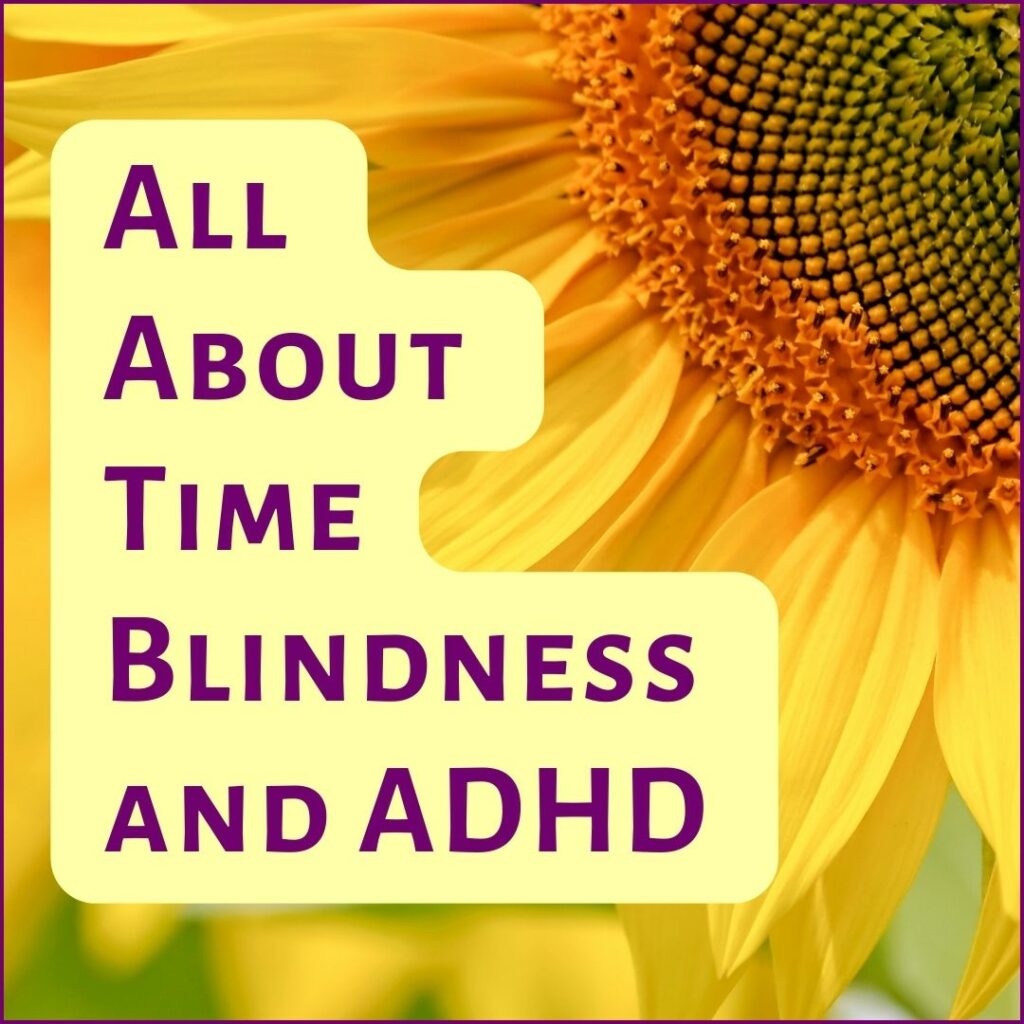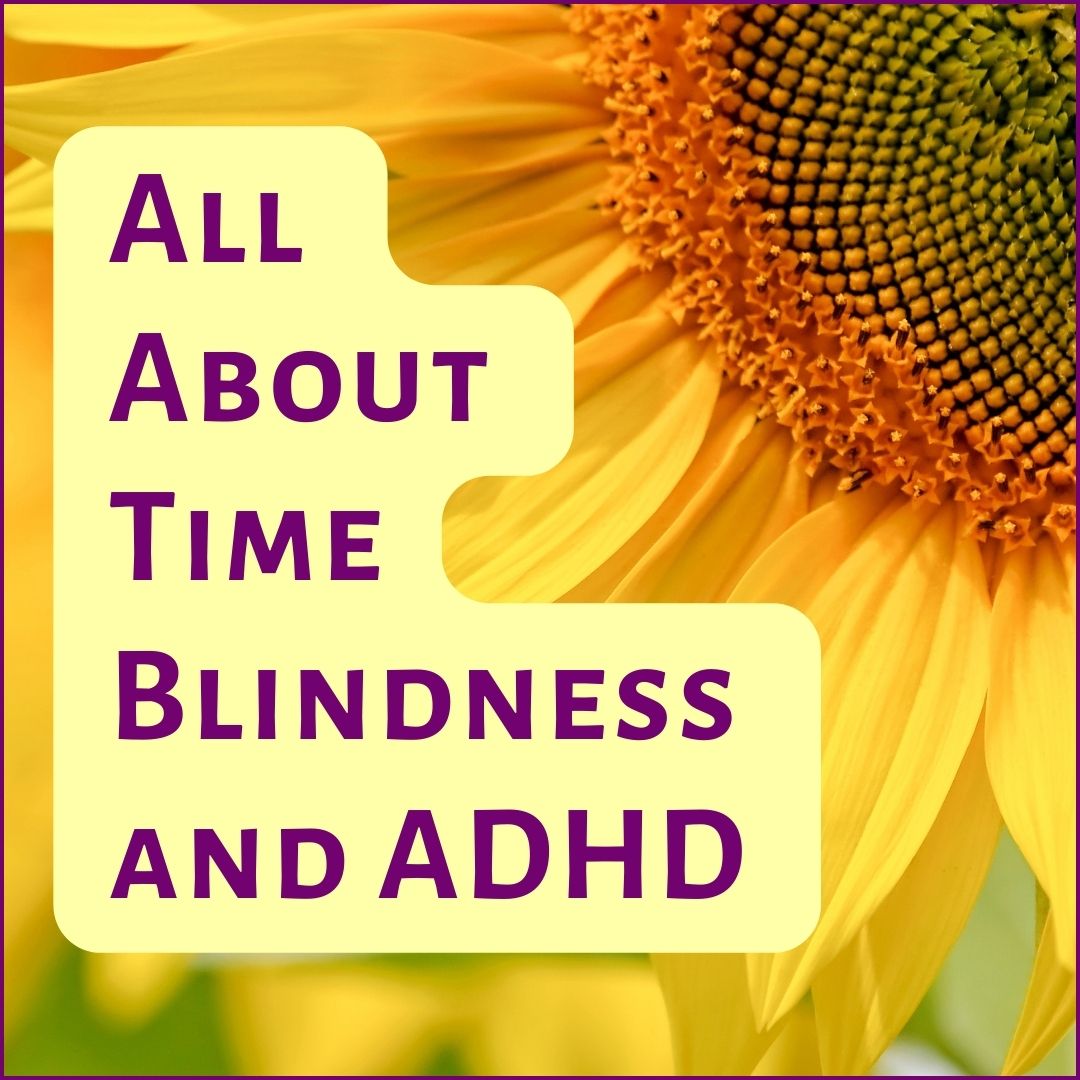All About Time Blindness and ADHD
I admit, I struggle with time blindness – big time. It took me a long time to understand that this was a part of my ADHD. I was forever under or over-estimating how long something would take, or how recently (or not) something had occurred. I still do!
Time blindness is one of the most commonly reported ADHD symptoms. It’s important to note that it is not an intentional disregard of time, but an actual inability to perceive it acurately.
But what is it really and why do people with ADHD struggle with it so often? Let’s chat about it.


Why Do People With ADHD Struggle With Time Blindness
Time blindness is the inability to accurately sense or gauge the passage of time. It is a cognitive condition to causes difficulties in perceiving or measuring time.
Why exactly time blindness occurs is not definitively understood, we do know that it is one of the main executive function areas that seems to be impacted by ADHD and other neurotypical brain patterns. Here are some of the current theories about why time blindness occurs.
- The Scalar Expectancy Theory (SET) – this related the measure of time to an internal clock that aligns with pulse rate. Because of this, it is thought that for neurotypical people are able to estimate with reasonable accuracy when one minute has gone by because their brain knowns how many time, on average, their heart beats in a minute and as the minute gets closer, they will intuitively start to notice their minute is almost up. ADHD may not have that internal clock.
- Differences in prefrontal cortex. Studies have shown a definitely link between neurotypical brains vs ADHD brains and the differences in prefrontal cortex. Not only may the prefrontal cortex be smaller in individuals with ADHD, but lower levels of activity in this brain region may also contribute to time blindness.
- Dopamine Disruption – some researches have also found that time blindness and misperception is often found in conditions where dopamine is not getting where it needs to go in the brain. ADHD people are known to be dopamine chasers.
How Time Blindness Shows Up In ADHD People
Time blindness in people with ADHD can be incredibly frustrating – for both the individual with ADHD and those around them. TIme blindness can cause dificulties in friendships, relationships, and work. Here are some of the most common ways time blindness shows up in people with ADHD.
- Missed Appointments – not recognizing what time it is, or sometimes even what day it is leads to missed appointments.
- Late Fees – Unreturned library books, bills not paid on time, etc. lead to late fees. (we sometimes call this the ADHD tax).
- Chronic Lateness – Getting engaged in what you are doing and forgetting to allow enough time for the next thing on the schedule means chronic latenss.
- Missed Deadlines – having difficulty managing time leads to missed deadlines and/or a cycle of procrastinating and then stressing to complete a project by the deadline.
- Forgotten Important Dates – if we forget what day it is, how can we remember if it’s our best friends birthday or our wedding anniversary?
- Inability to Stick to a Schedule – Sticking to a schedule or routine is difficult for folks with time blindness. ADHD people tend to want to “go with the flow” which makes consistent scheduling difficult.
- Never knowing if something was 2 days ago or 2 years ago. – Oh how I struggle with this one. I recently told a doctor I’d had a procedure like “maybe three years ago” – friends, it was 7 years ago!
- Underestimating how much time it will take to do something – People with ADHD always think everything will take much less time than it really does. Or they compensate by OVER estimating. It’s not uncommon for ADHD people to fully believe a project will only take an hour, only to find themselves 3 hours in and only half way done….usually with a deadline looming!
- Burnout – All of this rushing to get things done leads to exhaustion and burn out. In addition, we are prone to overcommitting because of time blindness, also leading to burnout.


Tips For Managing Time Blindness
If you or a loved one has ADHD and are struggling with time blindness, here are a few things you might try. Remember that it’s likely you’ll need a combination of things to assist and not just one tip.
- Timers and Alarms – This is the number one tip. Set timers and alarms for everything. BUT – not just one alarm. Set at LEAST two. One to let you know it’s time to wrap up what you are doing and then one for when you need to be doing whatever you are setting the alarm for. For example, if I have an appointment at 12 noon, I have one alarm go off at 11:45 to alert me to a transition and another at 11:58 that says “appt in 2 minutes”. Sometimes I even set a third alarm!
- Visual Schedules. – Calendars hung prominently where you (and anyone who needs them) can see them. You may want a a calendar and a weekly calendar. You can use different color pens for different types of appointments, or different color sticky notes on a wall. Whatever type of visuals will help you or your loved one. Picture charts are great for kids for helping them follow a routine.
- Task Buster – Break up your tasks or jobs to smaller ones and set timers for each step to help you stay on track.
- Apps – There are apps that help people track time, manage projects, and keep track of chores and jobs needing to be completed.
- Identify Time Sucks – sometimes we find the day has gone by and we don’t feel like we accomplished anything. Look at what was sucking your time. Did you spend too much time browsing YouTube? Watching TikTok? Playing a Video Game? Pay attention to where you are spending your time, you’ll identify your time sucks and can create a plan to manage those time sucks.
- Build In Breaks – If you are working on a long or difficult project, make sure you build in breaks. Either take a short break every so much time, or after completing the first step, etc. Having built in breaks helps the ADHD brain from taking unscheduled breaks.
- Give Yourself Buffers – Give yourself every possibility of being successful by giving yourself time buffers. If you think it’s going to take you 30 minutes to do something, estimate 45. If you think you need an hour to do something, plan one and a half hours.
- Pause Before Taking On A New Commitment – When someone asks if you can do something, or attend a meeting, or bake cookies – don’t say yes immediately. Take a moment. Pause. Think about what is being asked of you and what it will take to complete what’s being asked. Look at your calendar for conflicts. It’s okay for you to say “no” when you don’t have the time, energy, or even interest for the thing you are being asked to do.

If you or your loved one is struggling with time blindness, consider getting a coach. Specificlly – me! I can help you identify your time sucks, break down bigger tasks, and manage your time more effectively.
Go ahead and book your free, no obligation discovery call with me today!

 Don’t Delay Joy
Don’t Delay Joy 
Kat Sweeney, MCLC

